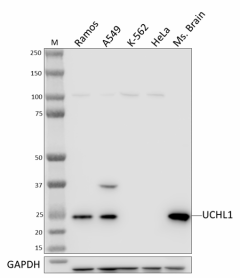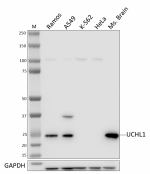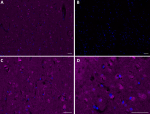- Clone
- A19092E (See other available formats)
- Regulatory Status
- RUO
- Other Names
- Ubiquitin carboxyl-terminal hydrolase 1, PGP9.5, Ubiquitin Carboxyl-Terminal Esterase L1, Neuron Cytoplasmic Protein 9.5, HEL-117, UCH-L1, HEL-S-53, NDGOA, PARK5, PGP95, SPG79
- Isotype
- Mouse IgG2b, κ
- Ave. Rating
- Submit a Review
- Product Citations
- publications

-

Whole cell extracts (15 µg total protein) from Ramos and A549 (positive control) lysates, K-562 and HeLa (negative control) lysates, and mouse brain lysates were resolved by 4-12% Bis-Tris gel electrophoresis, transferred to a PVDF membrane, and probed with a 1:8000 dilution of purified anti-UCHL1 antibody (clone A19092E) overnight at 4°C. Proteins were visualized by chemiluminescence detection using HRP goat anti-mouse IgG antibody (Cat. No. 405306) at a 1:3000 dilution. Direct-Blot™ HRP anti-GAPDH antibody (Cat. No. 607904) was used as a loading control at a 1:25000 dilution (lower). Lane M: Molecular weight marker -

IHC staining of Purified anti-UCHL1 (clone A19092E) on formalin-fixed paraffin-embedded human brain tissue. Following antigen retrieval using Citrate Buffer, 10X (Cat. No. 420902), the tissue was incubated with (panel A) and without (panel B) 5 µg/mL of Purified anti-UCHL1 (clone A19092E) followed by incubation with Alexa Fluor® 647 Goat anti-mouse IgG (Cat. No. 405322) for 1 hour at room temperature. Nuclei were counterstained with DAPI (Cat. No. 422801). Images were captured with a 10X (panel A and B), 20X (panel C) and 40X (panel D) objective. Scale bar: 50 µm
Ubiquitin carboxyl-terminal hydrolase L1 (UCHL1) is a thiol protease and member of the ubiquitin carboxyl-terminal hydrolase (UHC) family of deubiquitinating enzymes (DUBs). Highly expressed in the brain and neuroendocrine system, UCHL1 maintains long-term potentiation (LTP), regulates synaptic structure and function, plays a role in the protection of neuroendocrine cells, and is required for the structure and function of neuromuscular junctions. As an important component of the neuronal ubiquitin-proteasome pathway (UPP), UCHL1 tags aberrant proteins for proteasomal degradation, stabilizes and recycles free ubiquitin, regulates axonal transport, plays a critical role in axonal and neuronal integrity and repair, and may protect them from hypoxia-induced cell death following injury and ischemia. Loss or mutation of UCHL1 has been linked to axonal and dendritic pathology and subsequent deterioration of cognitive and motor functions and neurological disorders such as Alzheimer’s disease, Parkinson’s disease, and Amyotrophic lateral sclerosis, thus making it an important potential therapeutic target for such disorders.
Product DetailsProduct Details
- Verified Reactivity
- Human, Mouse
- Antibody Type
- Monoclonal
- Host Species
- Mouse
- Immunogen
- Recombinant human UCHL1 protein
- Formulation
- PBS, 0.5% BSA, 0.09% sodium azide.
- Preparation
- The antibody was purified by affinity chromatography.
- Concentration
- 0.1 mg/mL
- Storage & Handling
- The antibody solution should be stored undiluted between 2°C and 8°C.
- Application
-
WB - Quality tested
IHC-P - Verified - Recommended Usage
-
Each lot of this antibody is quality control tested by western blotting. For western blotting, the suggested dilution of this reagent is 1:8000. For immunohistochemistry on formalin-fixed paraffin-embedded tissue sections, a concentration range of 1 - 10 µg/mL is suggested. It is recommended that the reagent be titrated for optimal performance for each application.
- Application Notes
-
This clone was tested for ICC using HeLa cells (negative control) and Ramos cells (positive control) using three different fixation/permeabilization methods: methanol only, 4% PFA + methanol, and 4% PFA + Triton X-100. Each method produced nuclear and cytosolic staining in positive controls as well as cytosolic staining in negative controls.
This clone failed to adequately enrich UCHL1 from Ramos whole cell extracts.
For immunohistochemistry (IHC-P), Citrate Buffer, 10X (Cat. No. 420902) as antigen retrieval system is recommended. - RRID
-
AB_2904442 (BioLegend Cat. No. 601351)
Antigen Details
- Structure
- UCHL1 is a 223 amino acid protein with an expected molecular weight of 27 kD.
- Distribution
-
Expressed primarily in the central nervous system and gonads / Endoplasmic reticulum and cytoplasm
- Function
- Hydrolase, Thiol protease
- Biology Area
- Cell Biology, Mitochondrial Function, Neurodegeneration, Neuroscience, Ubiquitin/Protein Degradation
- Antigen References
-
- Bilguval K, et al. 2013. PNAS. 110:3489-94.
- Bishop P, et al. 2016. Biochem. J. 473:2453-62.
- Graham S and Liu H. 2017. Ageing Res. Rev. 34:30-38.
- Gene ID
- 7345 View all products for this Gene ID
- UniProt
- View information about UCHL1 on UniProt.org
Related Pages & Pathways
Pages
Other Formats
View All UCHL1 Reagents Request Custom Conjugation| Description | Clone | Applications |
|---|---|---|
| Purified anti-UCHL1 | A19092E | WB,IHC-P |
Compare Data Across All Formats
This data display is provided for general comparisons between formats.
Your actual data may vary due to variations in samples, target cells, instruments and their settings, staining conditions, and other factors.
If you need assistance with selecting the best format contact our expert technical support team.










Follow Us